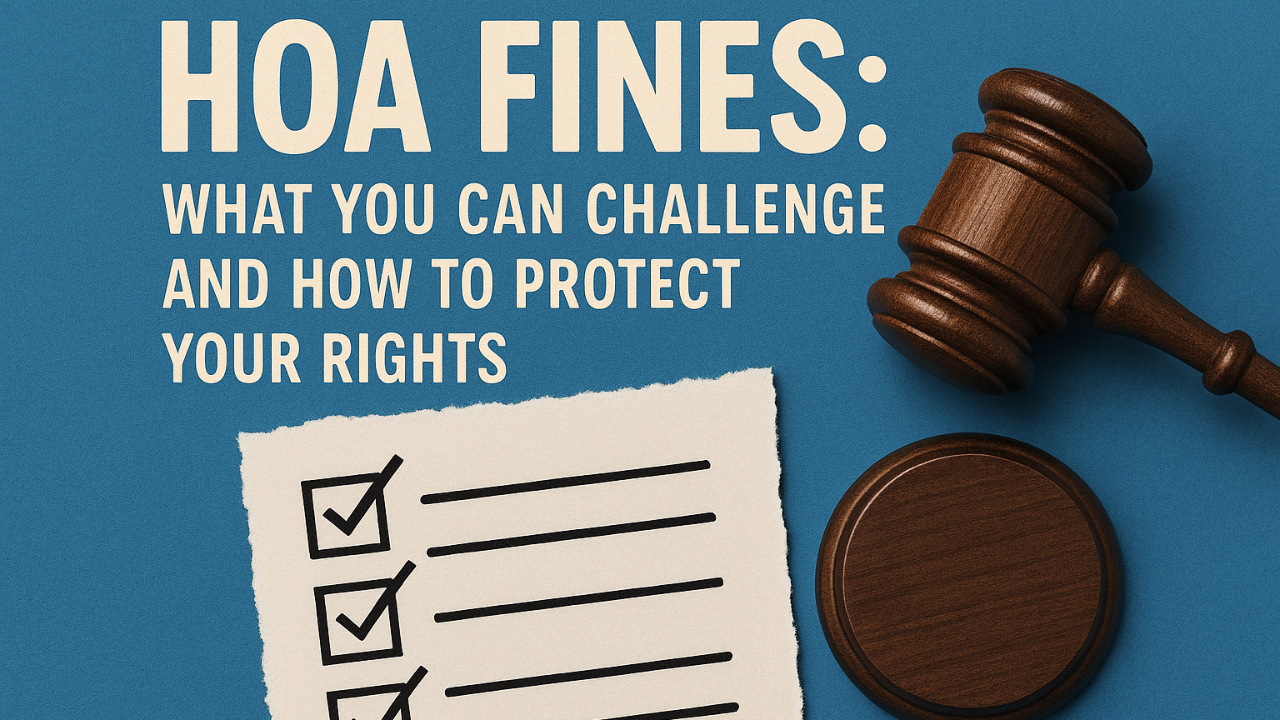HOA Fines: What You Can Challenge and How to Protect Your Rights

Living in a community with a homeowners association (HOA) can offer perks—cleaner common areas, well-kept neighborhoods, and shared amenities. But it also comes with rules, and sometimes, fines. While many violations are legitimate, not all HOA penalties are set in stone. As a homeowner, you have the right to question unfair charges and make sure the association follows the law and its own governing documents. Here’s what you can challenge and how to protect yourself in the process.
1. Fines That Aren’t Backed by Written Rules
Your HOA can only fine you for violations that are clearly stated in the community’s governing documents—usually the Covenants, Conditions, and Restrictions (CC&Rs), bylaws, or official policies. If the rule isn’t written down or the fine isn’t authorized, you can dispute it. Ask for a copy of the rule and the section where your supposed violation is defined. If they can’t point to it, the fine may not hold.
2. Fines Issued Without Proper Notice
Most states require HOAs to follow specific procedures before issuing a penalty. This often includes sending a written notice, describing the violation, and giving you a chance to fix the issue. If your HOA skipped steps—maybe they didn’t notify you properly or gave you too little time to respond—you have grounds to challenge the fine. Due process applies here, and the board must follow it.
3. Inconsistent or Selective Enforcement
If your HOA is enforcing a rule against you but ignoring similar violations from other homeowners, that’s selective enforcement—and it’s not allowed. HOAs must treat everyone equally. Gather evidence, like photos or observations, showing that other residents aren’t being fined for the same issue. This strengthens your case and highlights the inconsistency.
4. Unreasonable or Excessive Penalties
Some fines go beyond what’s reasonable or what the governing documents allow. Whether the penalty is way too high, issued daily without warning, or tied to something minor, you can challenge it. HOAs must act reasonably, and courts often side with homeowners when the punishment doesn’t match the violation.
5. Violations Based on Misunderstandings
Neighbors report things incorrectly. Board members make assumptions. Sometimes violations are simply wrong. Maybe they misidentified your property, misread a rule, or assumed neglect when you were already fixing the issue. You’re allowed to ask for clarification and provide evidence to clear things up.
Read more: How HOA Boards Can Make Fairer Decisions and Reduce Conflicts
How to Protect Your Rights
Keep everything in writing.
Record all communication with the HOA. Written documentation helps you stay organized and gives you proof of what was said and when.
Request a hearing.
Most HOAs must offer a formal hearing where you can explain your side. Bring documents, photos, or witnesses if you can.
Know your governing documents.
Understanding your CC&Rs puts you in a stronger position. The more you know, the easier it is to spot mistakes.
Stay respectful and calm.
Even if you’re frustrated, professionalism goes a long way. Boards are more willing to work with homeowners who communicate clearly and respectfully.
Consult a lawyer if needed.
If the fine is significant or the situation escalates, getting legal advice can protect you from future problems.
Final Thoughts
HOA fines don’t have to be intimidating, and you’re not powerless when something feels unfair. With the right knowledge and a calm, organized approach, you can push back against improper penalties and make sure your rights are respected. At the end of the day, your HOA works for the community—they’re not above the rules they enforce.
For legal help in California and your other needs, contact BERYS LAW on this page. We also offer courses on real estate investing, landlording, and templates right here!
Stay connected with news and updates!
Join our mailing list to receive the latest news and updates from our team.
Don't worry, your information will not be shared.